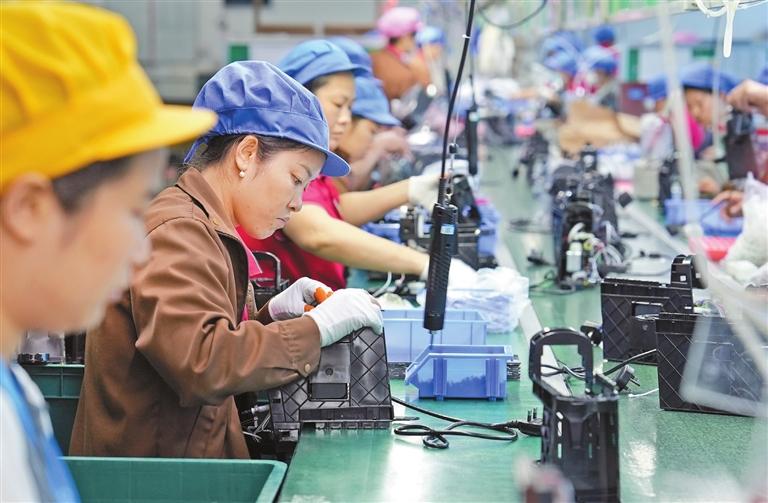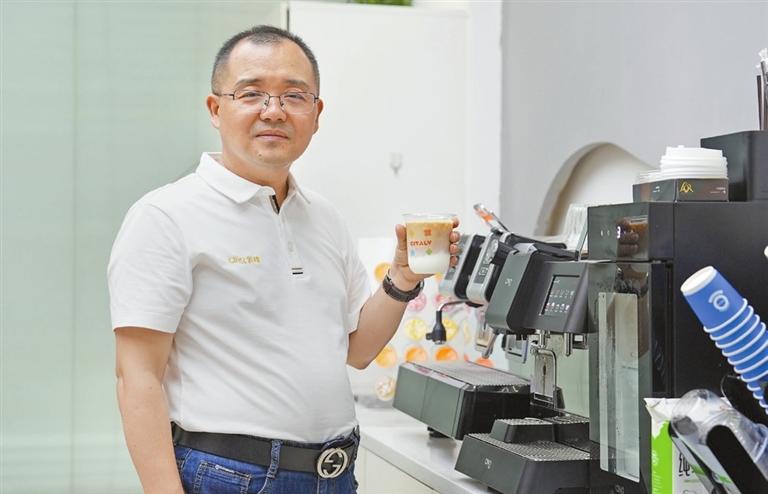


Yang Yunfei 1017800664@qq.com IN tea-drinking China, coffee machines were once exotic imports from overseas, but they have now evolved into one of the country’s strong export products. According to the latest available customs data, China exported 95.55 million coffee machines in 2023, with one in every three produced in the Guangdong-Hong Kong-Macao Greater Bay Area. Pioneering coffee innovation Since its founding in 2008, Cino Technology (Shenzhen) Ltd. has established itself as a leading innovator and manufacturer in the coffee machine sector. Based in Bao’an District, Shenzhen, the company pioneered China’s first commercial capsule coffee machine and introduced the world’s first in-car coffee machine. With more than 270 patents and honored as a “national high-tech enterprise,” Cino has carved out a niche in China’s bustling tech-manufacturing ecosystem as a pioneer in capsule coffee systems. According to founder and CEO Steve Liu, the company is creating new frontiers in beverage technology with cutting-edge capsule coffee machine solutions for home, office, commercial, and automotive use. Since 2010, the company has sold more than 5 million capsule coffee machines to clients across 87 countries and regions. Simplifying coffee brewing “The majority of our clients are top-tier coffee chains or retail distributors in their markets,” said Liu. “Cino has always adhered to the philosophy of simplifying the coffee-making process, aiming to help our clients run their coffee business more easily.” The company’s “coffee simplified” notion resonates globally — capsule coffee machines now account for 65% of household coffee makers in Europe, the world’s largest coffee market, according to data from Euromonitor. Before setting up Cino, Liu worked in foreign trade and needed to frequently travel to Italy for business in 2002 and 2003. Watching Italians labor over Moka pots that slowly brew coffee, Liu recognized that this traditional coffee-brewing method was too cumbersome for everyday use. “I began asking, could there be a better way to help people brew coffee more efficiently?” Liu’s curiosity sparked an exploration of ways to simplify the coffee-making process, leading him to develop a machine that uses coffee capsules. By using pre-portioned, pre-ground coffee capsules, the brewing process is dramatically streamlined. In addition, nitrogen-sealed aluminum capsules preserve the freshness of freshly ground coffee for 18 months, which would otherwise taste fresh just within two hours of grounding. This game-changing advancement revolutionized home brewing and enabled capsule machines to capture 40% of Europe’s home coffee market. Liu said the company shifted focus to commercial capsule machines after witnessing baristas struggling to keep up with demand during peak hours due to the labor-intensive nature of traditional brewing methods. Conventional processes involved multiple complex steps — grinding beans, dosing coffee, tamping grounds, and finally brewing — each introducing complexity and inconsistency. “We asked ourselves, could commercial capsule machines solve this problem?” Liu explained. “With capsules, baristas need only perform a single action — brewing. This saves nearly 70% of the time it takes to make coffee, significantly boosting output during peak hours and improving profitability for businesses.” Diversified markets Currently, Cino products primarily target overseas markets, such as South Korea, Europe, Southeast Asia, the Middle East, South America, and Africa. With export revenue rising 25% year on year to US$22 million in 2024, the company expects it to grow by another 20% this year. “By diversifying our business across regions — rather than concentrating resources in a single area — we’ve ensured resilience. As the saying goes, ‘Don’t put all your eggs in one basket,’” he said, adding that the U.S. market accounts for less than 5% of the company’s business. Liu said Cino customizes machines according to market preferences. The company produces low-pressure brewers for the North American preference of black coffee and high-pressure machines tailored for European espresso lovers. Liu anticipates emerging opportunities in Belt and Road Initiative partner countries. As their economies grow and living standards rise steadily, capsule coffee is gaining traction among their expanding middle-classes. This trend positions markets like the Middle East, Central Asia, and Southeast Asia as key priorities for Cino’s future expansion, according to Liu. Traditionally a tea-drinking country, China has lagged behind Western countries and many neighboring regions in Asia in coffee consumption. But the domestic market is swiftly catching up amid growing youth interest and urbanization, and many view China as one of the most promising coffee markets. A total of 66,920 coffee shops opened across China over the past year, according to Canyan.com, a food and beverage data provider. China’s coffee industry reached a market value of 624 billion yuan (US$86.24 billion) in 2024 and is poised to hit 1 trillion yuan this year, according to a November report by iiMedia Research, a market intelligence provider. Against this backdrop, Liu said he sees great potential for the domestic coffee market. “We believe that in the next five to 10 years, it is highly likely that coffee machines will enter thousands of Chinese households,” he said. Compared with overseas clients, Chinese consumers demand higher product standards, pushing Cino to develop more innovative, scenario-adapted designs, including compact, outdoor-friendly machines that cater to China’s growing camping culture. | 
